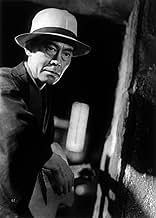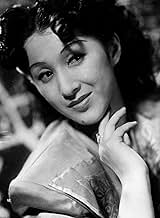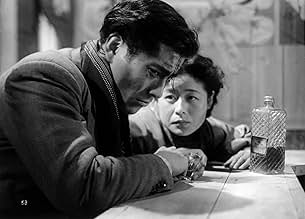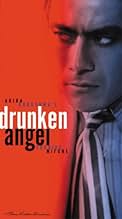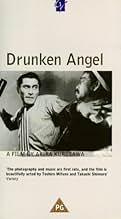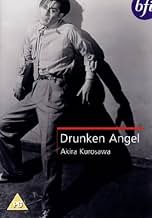A drunken doctor with a hot temper and a violence-prone gangster with tuberculosis form a quicksilver bond.A drunken doctor with a hot temper and a violence-prone gangster with tuberculosis form a quicksilver bond.A drunken doctor with a hot temper and a violence-prone gangster with tuberculosis form a quicksilver bond.
- Awards
- 4 wins total
Mayuri Mokushô
- Daughter at Flower Shop
- (as Kumiko Mokushô)
- Director
- Writers
- All cast & crew
- Production, box office & more at IMDbPro
Storyline
Did you know
- TriviaIn early drafts of the script, the story was almost entirely about Doctor Sanada (Takashi Shimura) and Matsunaga the thug (Toshirô Mifune) was a small supporting part. However, Akira Kurosawa was so impressed with Mifune's performance that he greatly increased the Matsunaga part, to the point where the Doctor and Matsunaga are almost equal in screen-time.
- GoofsEven though the story takes place during the hot summer, breath can be seen coming from characters in several scenes.
- Quotes
Dr. Sanada: The Japanese love to sacrifice themselves for stupid things.
- ConnectionsFeatured in Kurosawa and the Censors (2007)
Featured review
Considering this is the first collaboration between one of the 'heavyweight' director/star combos in cinema (tops in the Japanese film world, probably their equal to America's Scorsese/De Niro), this is quite a powerhouse of drama. That's not to say it's a completely dour film- some of Akira Kurosawa's trademark ironic (and subtle) humor is laced into scenes. But more-over, Kurosawa made here an important film for its time. While the team of Kurosawa and Toshiro Mifune would become even more internationally known for the thrilling Japanese mystery Stray Dog, and the masterpiece Rashomon, this film seems to get a little under-looked by Kurosawa fans (at least those that haven't quite dug into the catalog of their work). Is it their very best? Not quite, but it ranks high up there for me.
And it's not just the collaboration of the director and the star- there is also the co-star, Takashi Shimura, who has made his great mark on many of Kurosawa's films (the two I mentioned previous, plus his best role in Ikiru, and Seven Samurai as well). He plays a doctor who can't quite lay off the booze, even as he tries to help the people around him who seem to be contracting all sorts of bad diseases from the contaminated water (most notably tuberculosis). Mifune plays a member of the Yakuza crime gang, but is more of just a low level thug than a real 'somebody'. He's getting signs of TB, and goes to the 'good' doctor, who refuses help to the Yakuza, having outright contempt for them. Through the course of the film, The two actors portray these people as fragile, intense, hostile, compassionate, and with all the great emotional impact that comes in Japanese dramas.
While one might want to check this out for the context of the Yakuza part of the plot (which was one reason I wanted to check it out- not the Yakuza in today's Japanese cinema of course), the side that Kurosawa shows wonderfully in a film like Red Beard is also brought to light here. There's some action, but it gets thrown into a larger, more emotional context as Mifune's character starts to deteriorate. It becomes very theatrical in a sense, but there is also the realism that Kurosawa had on his sleeve, one that he had to express in post-war Japan (many of these post-war images are better expressed in Stray Dog, but he gives some ample time here too in a subtler, more dangerous context). So this mix comes together, and it turns into one hell of a picture. It may feel a little on the weak side compared to some of Kurosawa's magnum opuses (Seven Samurai, Ran, Yojimbo come to mind). Yet it ranks as an important point in the careers of the actors and director, and it contains enough great moments, enough in terms of the position of the camera and the often shattering music, to make it an under-rated (perhaps minor) classic. Personally, I loved it- especially the last twenty minutes.
And it's not just the collaboration of the director and the star- there is also the co-star, Takashi Shimura, who has made his great mark on many of Kurosawa's films (the two I mentioned previous, plus his best role in Ikiru, and Seven Samurai as well). He plays a doctor who can't quite lay off the booze, even as he tries to help the people around him who seem to be contracting all sorts of bad diseases from the contaminated water (most notably tuberculosis). Mifune plays a member of the Yakuza crime gang, but is more of just a low level thug than a real 'somebody'. He's getting signs of TB, and goes to the 'good' doctor, who refuses help to the Yakuza, having outright contempt for them. Through the course of the film, The two actors portray these people as fragile, intense, hostile, compassionate, and with all the great emotional impact that comes in Japanese dramas.
While one might want to check this out for the context of the Yakuza part of the plot (which was one reason I wanted to check it out- not the Yakuza in today's Japanese cinema of course), the side that Kurosawa shows wonderfully in a film like Red Beard is also brought to light here. There's some action, but it gets thrown into a larger, more emotional context as Mifune's character starts to deteriorate. It becomes very theatrical in a sense, but there is also the realism that Kurosawa had on his sleeve, one that he had to express in post-war Japan (many of these post-war images are better expressed in Stray Dog, but he gives some ample time here too in a subtler, more dangerous context). So this mix comes together, and it turns into one hell of a picture. It may feel a little on the weak side compared to some of Kurosawa's magnum opuses (Seven Samurai, Ran, Yojimbo come to mind). Yet it ranks as an important point in the careers of the actors and director, and it contains enough great moments, enough in terms of the position of the camera and the often shattering music, to make it an under-rated (perhaps minor) classic. Personally, I loved it- especially the last twenty minutes.
- Quinoa1984
- Jul 30, 2005
- Permalink
- How long is Drunken Angel?Powered by Alexa
Details
- Release date
- Country of origin
- Language
- Also known as
- Pijani andjeo
- Filming locations
- Toho Studios, Tokyo, Japan(Studio)
- Production company
- See more company credits at IMDbPro
Box office
- Gross US & Canada
- $46,808
- Opening weekend US & Canada
- $15,942
- Jul 28, 2002
- Gross worldwide
- $46,961
- Runtime1 hour 42 minutes
- Color
- Aspect ratio
- 1.37 : 1
Contribute to this page
Suggest an edit or add missing content


